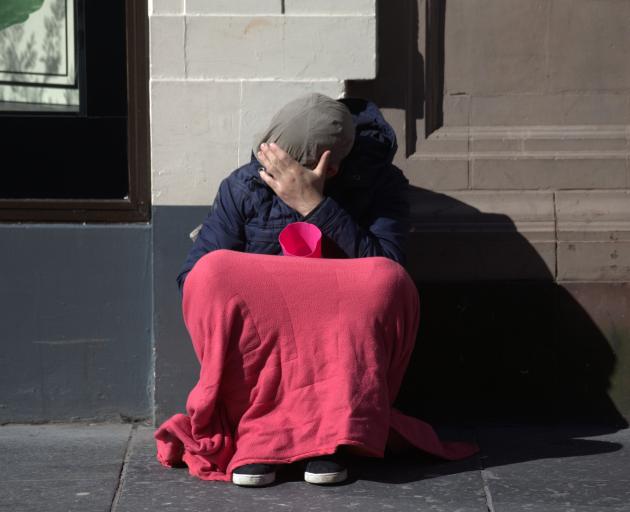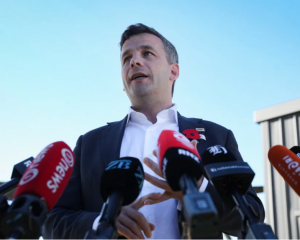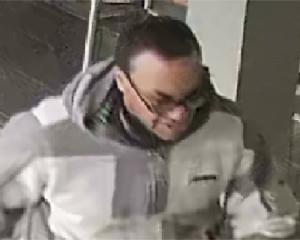
More than 80 per cent of all homeless people turning up to community emergency housing providers in the last year were turned away because the system is bursting at the seams, according to an independent housing stocktake to be released today.
And the number of recorded homeless people without a safe and secure place to live is expected to rise significantly, as more struggling people are told that help is available and come out of the shadows.
The report, authored by economist Shamubeel Eaqub, University of Otago Professor of Public Health Philippa Howden-Chapman and the Salvation Army's Alan Johnson, will be released this morning by Housing Minister Phil Twyford.
The Government describes it as an independent stocktake of the housing crisis to help focus its work. But National's housing spokesman, Dunedin-based MP Michael Woodhouse has called it a "smoke and mirrors" exercise to find the numbers to fit the Government's narrative, when the housing market is "flat to falling".
The report is understood to bring together figures across a number of areas including homelessness, the rental market, housing affordability - including the rising costs relative to wage increases - and housing supply nationwide, with a specific focus on Auckland.
One of the report's main focuses will be to highlight a hidden homeless population that is not officially monitored or recorded.
However, community emergency housing providers report they are at full capacity, and their data from last year indicate that for every 10 homeless people that approach them, eight to nine are turned away.
The report will refer to a burgeoning "floating population" - people without safe and secure housing, including in temporary housing, sharing with another household, or living in uninhabitable places.
The report is understood to say that greater awareness of the issue, along with more information campaigns about where to get help, is expected to lead to reported homelessness getting worse.
The report is intended as analysis of the housing issue, and is not expected to make any recommendations for action.
One indication of the extent of the crisis in the report is an extra 2000 pensioners receiving the accommodation supplement last year.
Auckland Action Against Poverty spokesman Alastair Russell said the magnitude of the homelessness problem was "huge".
"We are continually assisting people into motels and encountering people living in cars, or 10 to 12 people in grossly overcrowded situations. It is absolutely appalling.
"And it's is gradually getting worse, and as there is no coherent approach to addressing the issue at all. There is a chronic housing shortage and housing prices are out of reach.
"The [Government's KiwiBuild] focus on so-called affordable housing in the $500,000 to $600,000 range is aimed at Labour/National swing voters, but it doesn't address the social needs of the people at the bottom."
Russell said the Government's intention to build at least an extra 1000 state homes a year was "a drop in the bucket" that goes nowhere near far enough.
The closest official record of homelessness is the census, which monitors severe housing deprivation. In the 2013, about one in every 100 New Zealanders were in severe housing deprivation, compared to one in 120 in the 2006 census, and one in 130 in the 2001 census.
YaleGlobal Online, a magazine published by the prestigious US university, said last year that New Zealand had the worst per capita homelessness in the OECD - and almost double that of Australia - with more than 40,000 people living on the streets, in emergency housing, or substandard shelters.
Last July Auckland Council put the city's homeless number at 23,409 - 3000 more than four years ago.
The number includes those sleeping rough or in cars, in emergency housing, couch surfing or living in garages.
Tackling homelessness has been a key concern of Prime Minister Jacinda Ardern, and it was an increasingly important issue for the previous government following media reports last year of people living in their cars.
Last August the National-led Government gave $27 million to help Auckland City Mission build a new 80-unit complex, and $16.5 million for its Housing First programme to add 100 beds in Auckland, Tauranga, Wellington, and Christchurch.
Figures from the December 2017 quarter showed there were 7725 people waiting for a state house, up 5 per cent on the previous quarter.
Figures from the Ministry of Business, Innovation and Employment last year showed a housing shortfall of 71,000 nationwide, with 45,000 more houses needed in Auckland.
The next biggest housing shortfall was in greater Wellington, with a shortage of 9312 properties.
The Government has brought in a range of measures to curb the housing crisis, including stopping the transfer of Housing NZ properties to community providers, and introducing the Healthy Homes Guarantee Bill.
It intends to build 100,000 affordable homes through KiwiBuild and at least 1000 more Housing NZ homes a year.
National has been critical of these policies as it cites the mounting months before the first KiwiBuild home is built, and claims that cutting out community providers for social housing will see the overall supply decline.
Homelessness crisis
8 to 9 out of every 10 homeless people turned away from emergency housing providers
Hidden homeless population with no official monitoring or recording
1 in 100 live in severe housing deprivation in 2013 census, up from 1 in 120 in 2006 and 1 in 130 in 2001
Auckland Council says 23,409 in severe housing deprivation last year, up 3000 from the 2013 census
7725 on state house waiting list, up 5 per cent from Sept quarter
MBIE figures show a nationwide shortfall of 71,000 houses; 45,000 in Auckland
Comments
Didn't read the whole article Woodhouse has it just happened? What did National do? was this part of the labour 100 days plan that created all these homeless? Maybe start ripping into Cull and the Greens on the council in Dunedin, who make it hard for new businesses to setup in Dunedin, so no jobs , which equals homeless for some. Get the Greens and Cull on council to encourage Dunedin as an Oil and Gas Depot, some other place will get the gig so it most while be Dunedin.
is it any wonder national is in trouble when all we have to do is look around the streets. and see and hear of homeless. a very offensive remark.
@Rtn2Dun
It's not the councils fault these business's , hotels etc aren't doing their due diligence , or more likely ignoring it , and proposing non complying activities in the 1st place. They have all been in the wrong zones or massively outside of the district plan or RMA. So many have come to Dunedin expecting to flash the cash and all will be ignored. Betterways , for example, refused to compromise on design , height or location despite the council spending 10's of thousands of ratepayers money to come up with viable alternatives. If they want to build then they have to comply like everyone else.











